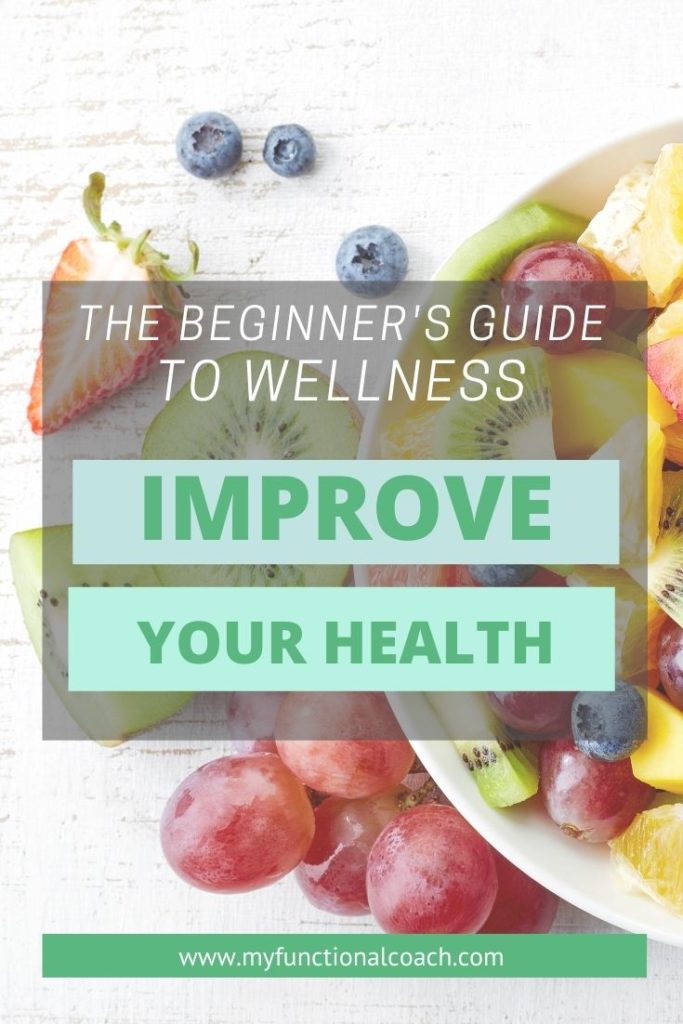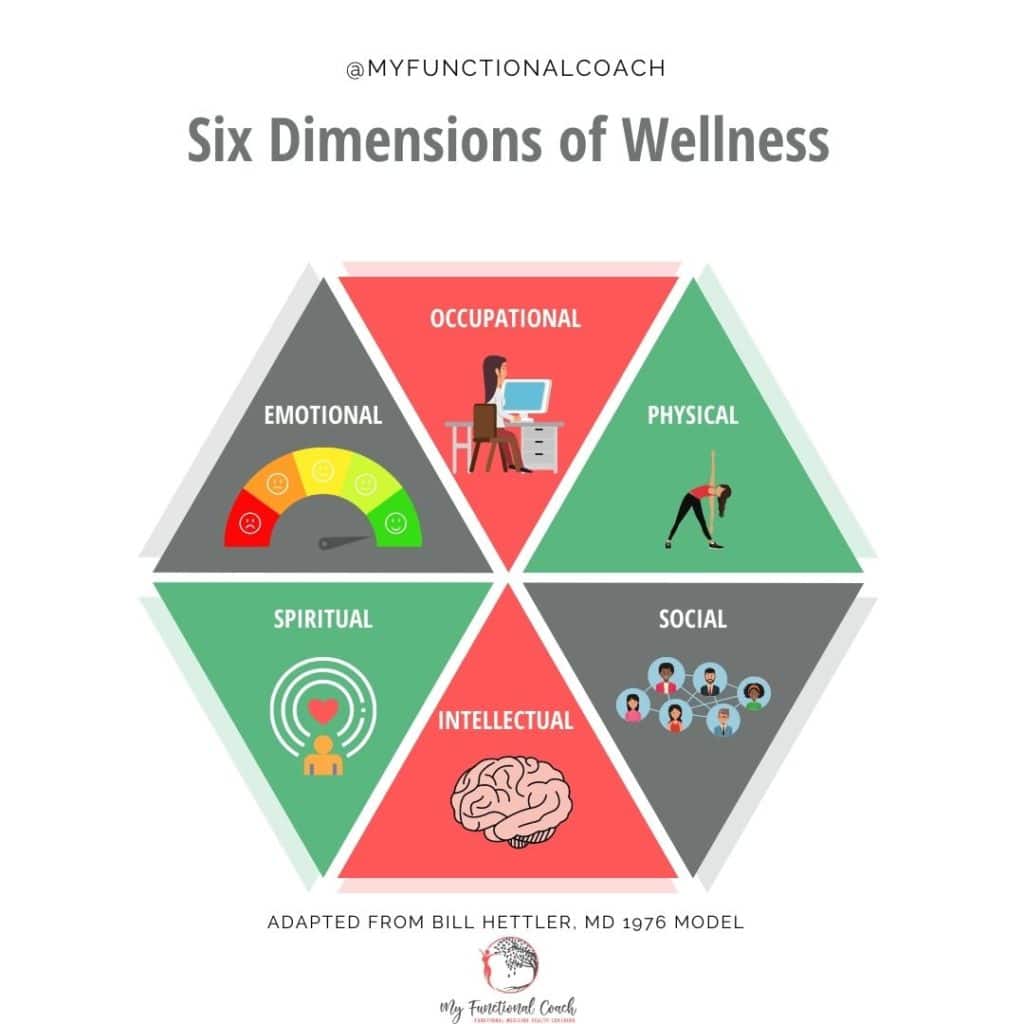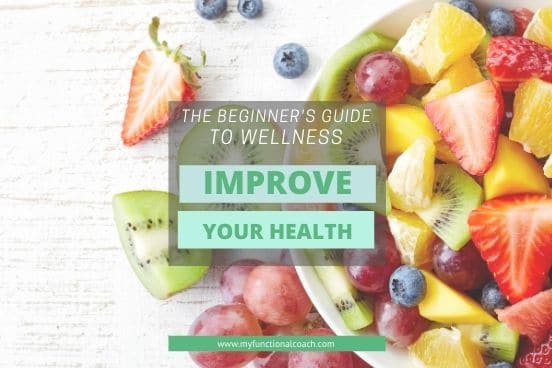A Beginner’s Guide to Wellness

Much of my functional medicine health coach training included learning about wellness from a holistic health point of view. In my coursework, I studied several wellness models. As I write these blog posts, I will introduce my favorite models. Today I start with the most basic wellness model, Hettler’s Six Dimensions of Wellness.
Definition of Wellness
Many people think wellness relates purely to your diet or physical well-being. Wellness is much more than your nutrition and fitness. The World Health Organization defines health as “a state of complete physical, mental and social well-being and not merely the absence of disease or infirmity.”
According to the National Wellness Institute, wellness is defined as “an active process through which people become aware of, and make choices toward, a more successful existence.”
Dr. Bill Hettler, the co-founder of The National Wellness Institute (NWI), developed six dimensions of wellness.
The six dimensions of wellness based on Hettler’s theory are emotional, occupational, physical, social, intellectual, and spiritual. Addressing all six dimensions of wellness builds a holistic sense of wellness and satisfaction. A healthy life involves living in balance with these six dimensions.
These 6 aspects of wellness play an important role in better health promotion. You can reach optimal wellness by understanding how to nourish each dimension of wellness. Let us examine each dimension in the sections below and how we can best improve them in our lives.
“Wellness is living your life consciously in ways that improve your health and well being.”
Michael Arloski, PhD
Hettler’s Six Dimensions of Wellness:
Hettler represents these areas of wellness using a wheel. I’ve adapted this model in the image below. The wellness wheel includes six dimensions.

1. Emotional Wellness
Emotional wellness refers to mental wellness. It includes awareness of our feelings, acceptance of ourselves, and feeling positive and enthusiastic about life.
Your emotional health and wellness depends on how well you understand your feelings and emotions and how you master these emotions. It’s important to express your positive and negative feelings effectively.
Embracing a positive attitude can do wonders for your health, as it can reduce stress. Because stress is a large cause of many diseases, it’s important to find ways to reduce stress.
Benefits of Improving Emotional Wellness:
- Helps you adjust easily to life’s challenges and obstacles.
- Improves the ability to manage a wide range of feelings.
- Helps you learn how to take responsibility for your actions.
- Gives you a growth mindset, allowing you to see life as full of opportunities.
- Reduces stress levels.
“Happiness can be found even in the darkest of times, if one only remembers to turn on the light.”
Albus Dumbledore
How To Improve Your Emotional Wellness
- Name and express your emotions.
- Calm yourself before reacting or saying something you might regret.
- Learn relaxation methods to manage stress. Meditation can help.
- Stay connected with your family, friends, and neighbors.
- Focus on your goals and forgive yourself for making mistakes.
2. Occupational Wellness
Occupational wellness refers to your feelings about work.
Are you feeling fulfilled and rewarded with your job and career path? Occupational wellness focuses on achieving a balance between work and leisure to give meaning and purpose. It’s important to enjoy your job. With job satisfaction, it’s easier to grow and move towards achieving your career goals.
Benefits of Improving Occupational Wellness:
- Improves your productivity and relieves work-related stress.
- Provides a healthy work environment.
- Prevents work-related diseases.
- Builds positive relationships with your boss and co-workers.
How To Improve Occupational Wellness
- Write your occupational goals and create a plan to achieve them.
- Take classes and learn new skills that focus on your professional development
- Don’t settle and keep motivated to work towards your goals.
- Enjoy what you do, do what you enjoy.
- Find your occupational passion.
- Increase your skills and knowledge to carry out your goals
- Find the benefits and positives in your current job.
- Create positive connections with your co-workers.
3. Social Wellness
Social wellness involves your relationships and how you connect with others at work and home. With social wellness, you can support and strengthen relationships with your friends, family, and co-worker. When you focus on improving your social networks, you become engaged with others in your community and learn to appreciate and accept diversity.
Social wellness is connected to emotional wellness. If your social wellness is lacking, emotional wellness will be hard to achieve.
Benefits to Improving Your Social Wellness
- Feel supported by having a strong network of people.
- Prevent feelings of isolation, loneliness, and stress.
- Experience mutual respect and enhance personal relationships and friendships.
- Creates a sense of belonging and makes people happier and healthier.
- Allows you to contribute to the common welfare of the community.
- Learn to live in harmony with others and may become a positive influence in their lives.
“The most basic and powerful way to connect to another person is to listen. Just listen. Perhaps the most important thing we ever give each other is our attention.”
Rachel Naomi Remen, PhD
How To Improve Your Social Wellness
- Make time every week for important relationships in your life.
- Become a support system to your friends and family.
- Take part in discussions where the viewpoints may differ from yours and listen carefully without judging.
- Join community groups such as clubs and community activism groups to expand your connections.
- Volunteer to enhance the lives of those around you.
4. Intellectual Wellness
Intellectual wellness refers to the ability to open our minds to new ideas and experiences. Your intellectual health allows you to focus on creative and stimulating activities. It enables you to challenge yourself to see different perspectives when you meet new situations and encourages you to increase your knowledge and understanding. You must make the time for yourself out of your busy routine for the activities that give you pleasure or increase your intellectual level.
Benefits of Improving Intellectual Wellness:
- Encourages learning to explore new ideas.
- Stimulates curiosity which motivates us to try new things and expands your knowledge.
- Improves ability to problem-solve.
- Expands and challenges your mind.

How To Improve Your Intellectual Wellness
- Read: read books, magazines, or other intellectually stimulating materials to nurture your intellectual wellness.
- Explore: seek opportunities to develop a new skill, do stimulating mental activities (such as games and puzzles), and take self-development classes.
- Create: practice your writing skills. Write a story or a poem.
5. Physical Wellness
Physical well-being focuses on taking care of our bodies by maintaining good habits while avoiding destructive habits. Physical wellness helps you develop and support a healthy body. The way we gain physical health is through improving eating habits, exercising regularly, getting adequate sleep, monitoring our vital signs, staying current on physical check-ups with our doctors, and seeking medical care when needed.
Maintaining a healthy BMI (body-mass index), avoiding harmful substances such as tobacco and drugs, and staying active are ways to achieve physical wellness. Physical wellness allows you to reduce the risks of chronic disease such as diabetes and obesity.
Benefits of Improving Physical Wellness:
- Affects your mind in a positive way.
- Body can function properly and optimally.
- Reduces the risk of chronic disease
- Increases your chance for a long and vibrant life.
- Strengthens your muscles and bones.
- Improves your immune system.
“To keep the body in good health is a duty…otherwise we shall not be able to keep the mind strong and clear.”
Buddha
How To Improve Your Physical Wellness
- Exercise for 30 minutes each day.
- Do brief spurts of activity if you are running short on time.
- Use a bike to go to work instead of your car.
- Engage in fitness challenges such as walking, hiking, running, and biking groups.
- Use the stairs instead of the elevator.
- Eat healthy foods. Only eat real foods. Avoid processed foods.
- Make sure you are sleeping 7-8 hours per night.
- Drink enough water.
6.Spiritual Wellness
Spiritual wellness involves our ability to find the purpose and meaning of our life to feel peace. It includes the appreciation for the natural beauty that surrounds us. Spiritual health represents your faith, beliefs, ethics, and values.
Benefits of Improving your Spiritual Wellness:
- Helps with hope, a positive outlook, forgiveness, and self-acceptance. Hope is a characteristic which can make us happier people.
- Assists you in finding the meaning and purpose of your life.
How To Improve Your Spiritual Wellness
- Start a yoga practice. Yoga enhances your spiritual wellness and relieves physical and emotional tension.
- Find a quiet place outside and spend some time alone.
- Meditate for 10 minutes each day.
- Take mindful walks in nature.
- Unplug from technology.
Conclusion
Wellness is multidimensional and holistic, encompassing lifestyle, mental and spiritual well-being, and your social/occupational environment. Wellness involves living a balanced life and practicing self care in each of these six key areas. For more information, check out the National Wellness Institute. The National Wellness Institute’s vision is to be the “worldwide voice of the wellness community” and is made up of many wellness practitioners.
References
https://nationalwellness.org/resources/six-dimensions-of-wellness/
https://www.washingtonblade.com/2010/06/10/finding-balance-6-dimensions-of-wellness/
https://familydoctor.org/mental-health-keeping-your-emotional-health/
https://wellness.ku.edu/seven-ways-improve-your-spiritual-health
https://www.nih.gov/health-information/emotional-wellness-toolkit
https://www.conehealth.com/services/behavioral-health/8-ways-to-better-social-wellness/
Disclaimer: I am not a medical doctor, therapist or Registered Dietitian. The information presented is purely for informational purposes. Check with a doctor or other medical provider before making any nutritional, fitness, or lifestyle changes. The author and blog disclaim liability for any damage, mishap, or injury that may occur from engaging in any suggestions or ideas from this site. For a full disclaimer, read this.





Needful content. Keep creating content like this! Tons of love for you
Thanks for sharing! So people forget that being well is based on so many factors! It’s a great read and thanks for sharing !